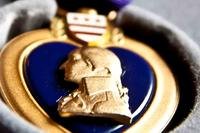The Purple Heart is awarded to military members who are injured and killed in combat, through an act of terrorism or by friendly fire. It acknowledges the physical sacrifice of service to the nation. Receiving a Purple Heart is an honor and comes with many benefits from state and federal governments and nonprofit organizations. Purple Heart Day is August 7.
What Military Service Members Are Eligible for the Purple Heart?
Members of the Army, Navy, Air Force, Space Force, Marine Corps and Coast Guard are eligible for Purple Heart citations.
Why Does a Service Member Receive a Purple Heart?
A Purple Heart is typically given to any service member who has been wounded or killed in the line of duty. Situations where a service member might be awarded a Purple Heart can include injuries during:
- Any action against an enemy of the United States.
- Any action with an opposing armed force of a foreign country in which the armed forces of the United States are or have been engaged.
- While serving with friendly foreign forces engaged in an armed conflict against an opposing armed force in which the United States is not a belligerent party.
- As a result of an act of any such enemy or opposing armed forces.
- As a result of an act of any hostile foreign force.
- While being taken captive or while held as a prisoner of war.
- As a result of an international terrorist attack.
- As a result of a foreign terrorist attack on domestic soil.
- By friendly fire while directly engaged in an armed conflict.
What Injuries Qualify for a Purple Heart?
Not every injury sustained in service qualifies for a Purple Heart award. In general, the injury must be both fairly serious and sustained as the direct result of enemy action. For example, post-traumatic stress disorder does not qualify, nor do first-degree burns, regardless of how or where they were received. According to Army Human Resources Command, these are injuries that do and not justify a Purple Heart award.
Injuries that do qualify for a Purple Heart:
- Injury caused by enemy bullet, shrapnel or other projectile created by enemy action.
- Injury caused by enemy-placed mine or trap.
- Injury caused by enemy-released chemical, biological or nuclear agent.
- Injury caused by vehicle or aircraft accident resulting from enemy fire.
- Concussion injuries caused as a result of enemy-generated explosions.
- Mild traumatic brain injury or a concussion severe enough to cause either loss of consciousness or restriction from full duty due to persistent signs, symptoms or clinical finding, or impaired brain functions for a period greater than 48 hours from the time of the concussive incident.
- A perforated eardrum suffered in combat action.
Injury or wound examples that do not justify a Purple Heart award:
- Frostbite (excluding severe frostbite requiring hospitalization from Dec. 7, 1941, to Aug. 22, 1951).
- Trench foot or immersion foot.
- Heatstroke.
- Food poisoning not caused by enemy agents.
- Chemical, biological or nuclear agents not released by the enemy.
- Battle fatigue.
- Disease not directly caused by enemy agents.
- Accidents, to include explosive, aircraft, vehicular and other accidental wounding not related to or caused by enemy action.
- Self-inflicted wounds, except when in the heat of battle and not involving gross negligence.
- Post-traumatic stress disorders.
- Airborne (for example, parachute/jump) injuries not caused by enemy action.
- Hearing loss and tinnitus (for example: ringing in the ears).
- Mild traumatic brain injury or concussions that do not either result in loss of consciousness or restriction from full duty for a period greater than 48 hours due to persistent signs, symptoms or physical findings of impaired brain function.
- Abrasions and lacerations (unless of a severity to be incapacitating).
- Bruises (unless caused by direct impact of the enemy weapon and severe enough to require treatment by a medical officer).
- Soft-tissue injuries (for example, ligament, tendon or muscle strains, sprains, etc.).
- First-degree burns.
Veteran Benefits for Purple Heart Recipients
Purple Heart recipients qualify for a wide variety of benefits, including Department of Veterans Affairs disability benefits and fee waivers, special discounts on VA home loans and automatic GI Bill benefits. Many states also have special benefits for Purple Heart recipients. Several nonprofit organizations, such as the Purple Heart Foundation, have special benefits and support for service members who have been awarded a Purple Heart.
Benefits for Purple Heart recipients.
History of the Purple Heart
The Purple Heart is also known as the nation's oldest military award. Although it has changed in title and use over the years, its roots can be traced back to the Badge of Military Merit ordered by then-Gen. George Washington on Aug. 7, 1782. That's why the gold medal on a purple ribbon bears the profile of Washington.
The original badge was directed by Washington to be “the figure of a heart in purple cloth, or silk, edged with narrow lace or binding.” But that award fell out of use after the Revolutionary War through just after World War I. In 1932, Douglas MacArthur, then the Army chief of staff, reestablished the award, renaming it the Purple Heart and directing it into the design we know today.
Exactly who is eligible to receive a Purple Heart has been expanded or reduced over time. For example, from 1942 to 1997, some non-service members serving with the military such as Red Cross workers or civilian government employees were eligible to receive the Purple Heart.
An estimated 1.8 million Purple Hearts have been awarded to U.S. troops.
Purple Heart recipients are celebrated annually on Aug. 7, which has been designated as Purple Heart Day.
Stay on Top of Your Veteran Benefits
Military benefits are always changing. Keep up with everything from pay to health care by subscribing to Military.com, and get access to up-to-date pay charts and more with all latest benefits delivered straight to your inbox.



























